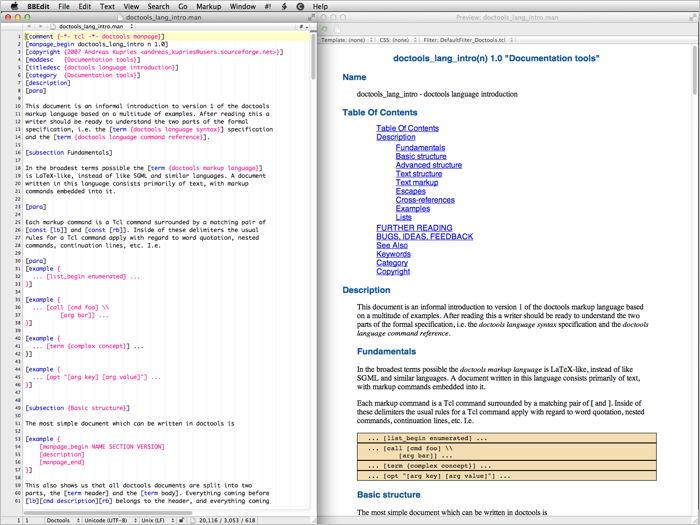Time lapse portrait sketches
Variations on a theme, obviously.
Posted on Thursday, January 31st, 2013. Tags: art, drawing, timelapse.
Tcl Doctools for BBEdit
Doctools is a Tcl-based markup language suitable for writing software documentation. BBEdit is a Macintosh text editor. I made a Doctools language module (for syntax highlighting) and preview filter and posted them on Github as Tcl Doctools for BBEdit.
Posted on Thursday, December 13th, 2012. Tags: bbedit, mac, tcl.
GIS Stack Exchange
GIS Stack Exchange is a question and answer site dedicated to helping people figure out GIS (geographic information systems) problems. It’s part of a larger Stack Exchange network of Q&A sites about various topics.
I received some helpful replies in response to a query I posted earlier this year, and have found useful information there as a result of other searches, too. So, in an effort to “learn by teaching”, I’ve decided to try contributing answers on a regular basis (at least weekly). I’m not qualified to address most of the topics that come up, but there is a large backlog of unresolved questions to peruse, and I’ve already found a few of interest. Even if I can’t provide authoritative answers, I hope that providing pointers to relevant references might help people figure things out.
Here are the comments I’ve offered so far:
- Cartograms: making base maps and facilitating size comparison (previously, here)
- Shapefiles: clarifying whether polygon features may intersect themselves (no)
- Projections: finding an implementation of space oblique mercator (PROJ.4 supports a Landsat-specific subset; sparked some more ideas for gtg)
One of my answers even got an upvote! So, yay. My geography degree was good for something.
Posted on Tuesday, December 11th, 2012. Tags: geography.
Pinboard bookmarks recipe for Calibre
Here is a script for Calibre which which retrieves your unread bookmarks from Pinboard and compiles them into an ebook. If you use Pinboard to save long articles to read later, and if you like to read long articles with an ereader instead of with your computer’s web browser, this may be the recipe for you. The script is called Pinboard.recipe and you can get it here: github.com/anoved/Pinboard-Recipe (see the Setup section to get started).
This is similar to the Safari Reading List recipe I wrote earlier this year.
Posted on Monday, December 10th, 2012. Tags: books, code, recipe.
Creative Uses of Creative Tools
Here is a drawing I made in LibreOffice, a free alternative to programs like Microsoft Office:
It’s drawn with the filled polygon tool. Since it’s a vector drawing, you might think each region of uniform color is a single discrete element. After all, that’s how you’d do it if you were making an animation or otherwise planning to take advantage of the nature of vector graphics to neatly resize or reposition the drawing.
But! Just because a tool is suitable for a certain kind of work doesn’t mean you can’t use it in other ways. (This probably explains why I’ve broken so many drill bits, but that’s another story.) Here’s another look at the drawing, with polygon borders turned on and transparency turned up:
It is mostly made up of a few simple shapes. In some places, though, I chose to “paint with polygons” instead of editing the existing vertices. The outcome is perhaps less versatile, but the act of carving out a contour by slapping down layers was more engaging than a more refined technique might have been. I might not have had the patience to finish the drawing, which I started spontaneously, if I’d been too concerned with placing every point perfectly.
Nothing beats the right tool for the job, but improvisation beats declining to try every time.
Posted on Monday, November 26th, 2012. Tags: art.
The New Media
I’m falling behind in the count as far as the sheer number of drawings needed to meet the month’s goal of 50 for NaNoDrawMo, but I am excited about some of the experiments I have done. Pictured here is a drawing done with colored graphite and another done with black and white pastel chalk on a piece of stone.
Posted on Sunday, November 25th, 2012. Tags: art, drawing.
NaNoDrawMo 2012 underway
 NaNoDrawMo is an annual drawing challenge inspired by National Novel Writing Month (NaNoWriMo). If a picture is worth a thousand words, and if 50,000 words is the target word count for a NaNoWriMo novel, then drawing fifty pictures in the month of November is an equivalent task. (Not hardly, in my estimation, but it’s an amusing equation and excuse enough.)
NaNoDrawMo is an annual drawing challenge inspired by National Novel Writing Month (NaNoWriMo). If a picture is worth a thousand words, and if 50,000 words is the target word count for a NaNoWriMo novel, then drawing fifty pictures in the month of November is an equivalent task. (Not hardly, in my estimation, but it’s an amusing equation and excuse enough.)
Here are a few of the drawings I’ve made so far.
I’ve been using my homemade paper for some of these.
Posted on Thursday, November 15th, 2012. Tags: art, drawing.
Clay Faces
Started with playing with clay recently. (Play-Doh and Sculpey, technically.)
It’s challenging, like anything new, but fun.
Posted on Wednesday, October 31st, 2012. Tags: art.















